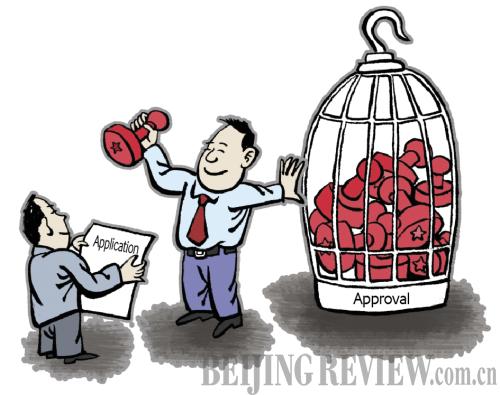|
 |
|
(XINHUA) |
Slashing items requiting administrative approval and relaxing registration requirements is also a central part of the government's efforts to encourage the growth of small and medium-sized businesses, which create more than 80 percent of jobs in China's urban areas.
To reduce the cost of opening a business in hopes of encouraging entrepreneurship, the State Council made a decision on October 25 to eliminate the minimum registered capital requirement for startups.
Invigorating the market
On May 13, during his speech at a high-level conference on transforming government department functions, Premier Li said that streamlining the government is to let the market play a bigger role in allocating resources and driving economic growth, and shift the government's focus on creating a good environment for development, providing quality public services and upholding social justice.
The market is the creator of social wealth, and the source of endogenous economic growth, Li added.
The main force for economic development lies in the market, and reform is expected to give people incentive to create wealth and boost the vitality of the economy, said Gao Xiaoping, an administrative management expert in Beijing.
In some cases, the government is not as effective as the market in regulating industry activities, experts say.
Previously, administrative approval was required for steel and cement projects in China, yet over the years, these industries have suffered from surplus capacity and overproduction. In contrast, household electric appliance manufacturing and garment-making have been regulated by market forces, and there is no serious overcapacity in these industries.
In the past two decades, the share of private capital in China's total fixed assets investment has increased from 30 percent to 60 percent; yet it still has obstacles to overcome in some industries.
Li cited the example of a company that had to go through more than 50 procedures across 27 government departments to gain approval to launch a new project. The process usually takes six to 10 months, and could dampen enthusiasm for investing, Li said.
In recent years, complaints about the lengthy procedures for obtaining professional qualifications have been growing. Many job hunters say that they have been excluded from the job market by requirements that seem irrelevant to their work. State Council departments have the right to certify 110 types of personal qualifications and grant 229 different qualification certificates.
| 